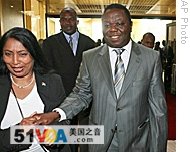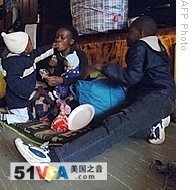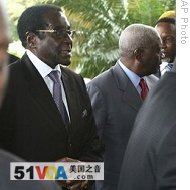Johannesburg
02 February 2009
Zimbabwe's parliament is expected to pass a constitutional amendment leading to the formation of a power-sharing government as outlined last week at a regional summit meeting. Reaction among the estimated three million Zimbabweans living in neighboring South Africa has been largely positive though tempered with some serious doubts.
 |
| Zimbabwe's opposition leader Morgan Tsvangirai (r) with South African Home Affairs official Priscilla Naildoo in Harare, 19 Jan 2009 |
Mr. Tsvangirai, who is to become prime minister in the new government, said that despite outstanding disputes the MDC felt obligated to try to ease the suffering of the Zimbabwean people.
"We hope that the MDC will be respected as an equal partner with ZANU-PF to resolve all these issues. And we hope that the country can begin again to have hope for the future," Mr. Tsvangirai said.
Nomalanga Dlamini is a 24-year-old teacher who fled the political and economic crisis in her country and now works as a domestic worker in Johannesburg.
"I think it is a great moment for Zimbabwe, because now we can go back to our home country and live happily because our schools, shops, hospitals will be in full operation and we will be happy about that," said Dlamini.
Another young Zimbabwean, Witness Dube, believes some of his countrymen will return because life as a refugee is hard. But, he asks, how many?
"Youth in South Africa, and I think elsewhere in the diaspora, they have become very desperate," said Dube. "Their livelihood is not as they would want. So with the hope and the promise that is in Zimbabwe right now, some would begin to move (back). It is a question of what structures are going to be put in place to it more attractive for the colleagues out in the diaspora," Dube said.
 |
| A refugee family from Zimbabwe sit together in the Central Methodist Church in Johannesburg, 30 Jun 2008 |
The chairman of the Zimbabwe Diaspora Nurses Association, Butholezwe Nyathi, is another Zimbabwean professional who fled because of hyper-inflation, low wages and political violence.
"This gives us a new start. We believe that if we are given incentives as nurses we will be able to go back and be able to contribute in the re-building process of the health system in Zimbabwe," said Nyathi.
Collen Shumba is a 42-year-old Zimbabwean who left his wife and four children back home in order to find work in South Africa. He says ZANU-PF did not abide by all of the agreements it made and he accuses it of unleashing a wave of terror against MDC supporters and human-rights activists.
"It is time for ZANU-PF to be genuine. I know MDC will follow the deal, but I do not trust ZANU-PF," said Shumba.
Noel Muguti was an MDC candidate for parliament in elections last March. But he fled the country in June after his wife was kidnapped and killed and he was tortured. He now lives along with hundreds of refugees at a church in Johannesburg.
 |
| Zimbabwe's Robert Mugabe, left, with Mozambique's Armanado Guebuza in Harare, 19 Jan 2009 |
The chairman of the MDC's Youth Assembly in South Africa, Rodwell Shambamuto, is also worried.
"We are happy with the decision of the National Council, but we are fearing for our president (Tsvangirai) because they may assassinate our president," Shambamuto said.
The MDC has demanded that several outstanding disputes be resolved by the time the new government is inaugurated in less than two weeks.
These include new national security laws, the release of dozens of activists - which the MDC says are being held on trumped-up charges - and an equitable distribution of key ministries, governorships and senior government posts.
A monitoring committee made up of representatives from each party is to resolve these and any other disputes.